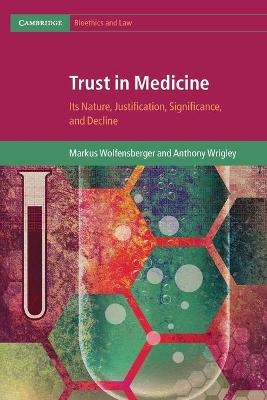
Trust in Medicine
Cambridge University Press (Verlag)
978-1-108-73273-4 (ISBN)
Over the past decades, public trust in medical professionals has steadily declined. This decline of trust and its replacement by ever tighter regulations is increasingly frustrating physicians. However, most discussions of trust are either abstract philosophical discussions or social science investigations not easily accessible to clinicians. The authors, one a surgeon-turned-philosopher, the other an analytical philosopher working in medical ethics, joined their expertise to write a book which straddles the gap between the practical and theoretical. Using an approach grounded in the methods of conceptual analysis found in analytical philosophy which also draws from approaches to medical diagnosis, the authors have conceived an internally coherent and comprehensive definition of trust to help elucidate the concept and explain its decline in the medical context. This book should appeal to all interested in the ongoing debate about the decline of trust - be it as medical professionals, medical ethicists, medical lawyers, or philosophers.
Markus Wolfensberger is Emeritus Professor of Otorhinolaryngology at the Universität Basel, Switzerland. Until his retirement in 2010, he was Head of the Department of Otorhinolaryngology, Head and Neck Surgery as well as Director of the Head Neck Tumour Centre at the University Hospital of Basle. He also holds a doctorate in medical ethics and was, for many years, chair of the Clinical Ethics Advisory Board at the University Hospital of Basle. His particular interest, both as a surgeon and as a researcher, was in cancer of the head and neck. As a clinical ethicist one of his major interests was in preventing unnecessary and over-aggressive treatment. Anthony Wrigley is Professor of Ethics at the Centre for Professional Ethics (PEAK), School of Law, Keele University. He is a philosopher with a special interest in issues in biomedical ethics. His particular area of interest is the analysis of key concepts in bioethics, including vulnerability, hope, harm, personhood, mental illness, consent for others, moral authority, and the nature of moral expertise. His work includes contribution to the European Textbook on Ethics in Research (with Jonathan Hughes et al., 2010), Ethics, Law and Society: Volume V: Ethics of Care, Theorising the Ethical, and Body Politics (edited with Nicky Priaulx, 2013), and Loss, Dying and Bereavement in the Criminal Justice System (edited with Sue Read and Sotirios Santatzoglou, 2018).
Part I. Introduction: 1. Introduction; 2. Empirical evidence for the decline of trust; Part II. The Nature of Trust: 3. A critical analysis of existing definitions of trust in medicine; 4. Proposing a new type of definition: the pattern-based definition; 5. A Pattern-based definition of trust; 6. Differentiating trust from related concepts; 7. Adapting the definition of trust to different situations; Part III. Justification of Trust: 8. Justification of epistemic trust; 9. Justification of patients' trust in physicians; Part IV. Significance of Trust: 10. Instrumental utility of trust; 11. The moral value of trust; Part V. The Decline of Trust: 12. Reasons for the decline of trust; Part VI. Perspectives: 13. Can we restore trust? List of references; Index.
| Erscheinungsdatum | 21.06.2021 |
|---|---|
| Reihe/Serie | Cambridge Bioethics and Law |
| Zusatzinfo | Worked examples or Exercises; 2 Tables, black and white; 1 Halftones, black and white; 4 Line drawings, black and white |
| Verlagsort | Cambridge |
| Sprache | englisch |
| Maße | 152 x 227 mm |
| Gewicht | 405 g |
| Themenwelt | Medizin / Pharmazie ► Medizinische Fachgebiete ► Medizinethik |
| Studium ► Querschnittsbereiche ► Geschichte / Ethik der Medizin | |
| Naturwissenschaften ► Biologie | |
| Recht / Steuern ► EU / Internationales Recht | |
| Recht / Steuern ► Privatrecht / Bürgerliches Recht ► Medizinrecht | |
| ISBN-10 | 1-108-73273-9 / 1108732739 |
| ISBN-13 | 978-1-108-73273-4 / 9781108732734 |
| Zustand | Neuware |
| Informationen gemäß Produktsicherheitsverordnung (GPSR) | |
| Haben Sie eine Frage zum Produkt? |
aus dem Bereich


